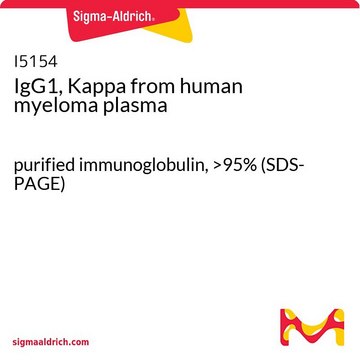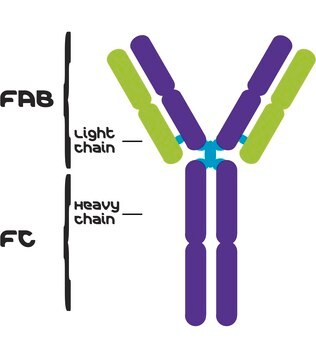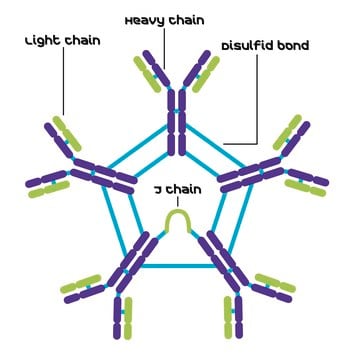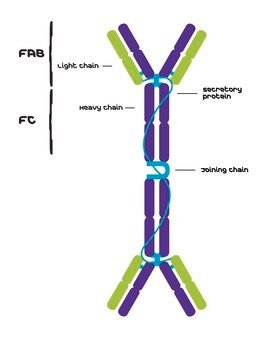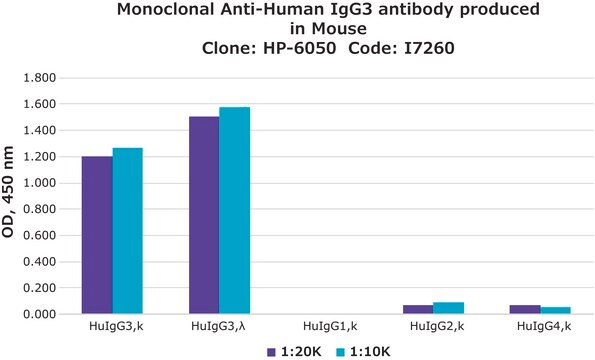I5654
IgG3, Kappa from human myeloma plasma
purified immunoglobulin, >90% (microfluidic capillary gel electrophoresis)
Sinónimos:
Human IgG3-κ
Iniciar sesiónpara Ver la Fijación de precios por contrato y de la organización
About This Item
Productos recomendados
origen biológico
human
Nivel de calidad
conjugado
unconjugated
forma del anticuerpo
purified immunoglobulin
Análisis
>90% (microfluidic capillary gel electrophoresis)
Condiciones de envío
dry ice
temp. de almacenamiento
−20°C
¿Está buscando productos similares? Visita Guía de comparación de productos
Descripción general
IgG antibody subtype is the most abundant serum immunoglobulins of the immune system. It is secreted by B cells and is found in blood and extracellular fluids and provides protection from infections caused by bacteria, fungi and viruses. Maternal IgG is transferred to fetus through the placenta that is vital for immune defence of the neonate against infections. IgG3 is the has a unique extended hinge region conferring greater flexibility
Human myeloma IgG3, κ is purified from human plasma by fractionation, ion-exchange, and affinity chromatography procedures.
Human myeloma IgG3, κ is purified from human plasma by fractionation, ion-exchange, and affinity chromatography procedures.
Aplicación
IgG3, kappa from human myeloma plasma has been used to determine the trisulfide levels in commercial therapeutic IgG1 antibodies and in human myeloma IgG1, IgG2, IgG3 and IgG4 antibodies.
The purified IgG3, κ may be used as an immunoglobulin calibrator, reference antigen, blocking agent or coating protein in a variety of immunoassays including ELISA, dot-blot immunobinding, Western immunoblotting, immunodiffusion, immunoelectrophoresis, hemagglutination, and cell-binding assays. Human myeloma IgG3 was for in flow cytometry in CHO cells.
Forma física
Solution in 20 mM tris buffered saline, pH 8.0.
Nota de análisis
The purity and identity are determined by immunoelectrophoresis, indirect ELISA and SDS-PAGE.
Cláusula de descargo de responsabilidad
Unless otherwise stated in our catalog or other company documentation accompanying the product(s), our products are intended for research use only and are not to be used for any other purpose, which includes but is not limited to, unauthorized commercial uses, in vitro diagnostic uses, ex vivo or in vivo therapeutic uses or any type of consumption or application to humans or animals.
Código de clase de almacenamiento
10 - Combustible liquids
Clase de riesgo para el agua (WGK)
WGK 1
Punto de inflamabilidad (°F)
Not applicable
Punto de inflamabilidad (°C)
Not applicable
Certificados de análisis (COA)
Busque Certificados de análisis (COA) introduciendo el número de lote del producto. Los números de lote se encuentran en la etiqueta del producto después de las palabras «Lot» o «Batch»
¿Ya tiene este producto?
Encuentre la documentación para los productos que ha comprado recientemente en la Biblioteca de documentos.
Los clientes también vieron
Characterization of trisulfide modification in antibodies
Gu S, et al.
Analytical Biochemistry, 400(1), 89-98 (2010)
Rangaiah Shashidharamurthy et al.
Journal of immunology (Baltimore, Md. : 1950), 183(12), 8216-8224 (2009-12-17)
CD32A, the major phagocytic FcgammaR in humans, exhibits a polymorphism in the ligand binding domain. Individuals homozygous for the R allelic form of CD32A (CD32A(R) allele) are more susceptible to bacterial infections and autoimmune diseases as compared with H allelic
David R Martinez et al.
Cell, 178(1), 190-201 (2019-06-18)
The placental transfer of maternal IgG is critical for infant protection against infectious pathogens. However, factors that modulate the placental transfer of IgG remain largely undefined. HIV-infected women have impaired placental IgG transfer, presenting a unique "disruption model" to define
Masayuki Hirano et al.
Nature immunology, 8(7), 762-771 (2007-06-15)
Because functional analysis of Fc receptors (FcRs) relies heavily on mouse models, the identification of another Fcgamma receptor is particularly noteworthy. We demonstrate that FcgammaRIV, identified here as the mouse ortholog of primate FcgammaRIII, required association of the FcR gamma-chain
S Hashira et al.
Pediatrics international : official journal of the Japan Pediatric Society, 42(4), 337-342 (2000-09-15)
Maternal immunoglobulin G (IgG), transferred across the placenta to the fetus during intrauterine life, is an important component of the neonatal immunological defence mechanisms against infection. There is controversy with respect to differences in placental transfer of the different IgG
Nuestro equipo de científicos tiene experiencia en todas las áreas de investigación: Ciencias de la vida, Ciencia de los materiales, Síntesis química, Cromatografía, Analítica y muchas otras.
Póngase en contacto con el Servicio técnico

